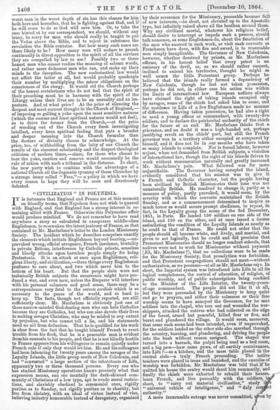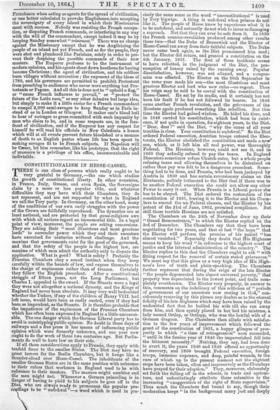" CIVILIZATION " IN POLYNESIA.
IT is fortunate that England and France are at this moment on friendly terms, that Napoleon does not wish to quarrel with England, and that England has a strong interest in re- maining allied with France. Otherwise this Polynesiau affair would produce mischief. We do not remember to have read anywhere a story so calculated to exasperate middle-class Englishmen, to re-awaken the latent jealousy of France, as that contained in Mr. Macfarlane's letter to the London Missionary Society. The incident which he describes comprises exactly the elements which irritate Englishmen beyond bearing,—un- provoked wrong, official arrogance, French insolence, brutality to private Britons, interference by Catholic priests, senseless and bloody attacks upon harmless people simply for being Protestants. It is an attack at once upon Englishmen, reli- gious liberty, and civilization,—three things every Englishman professes to care about, and two which move him to the bottom of his heart. But that the people slain were not technically British subjects the occurrence might have pro- duced a war, and even now, unless the Emperor will interfere 'with his personal calmness and good sense, there may be a correspondence very fatal to the entente cordiale which is so necessary to the peace of the world, and so hard to keep up. The facts, though not officially reported, are still sufficiently clear. Mr. Macfarlane is obviously just one of those narrow-minded God-fearing men who can hate Catholics because they are Catholics, but who can also devote their lives to making savages Christian, who may be misled to any extent by prejudice, but who cannot tell a lie, and his statements need no aid from deduction. That ho is qualified for his work is clear from the fact that he taught himself French to avert trouble from his flock, that he is a peaceable man is evident from his counsels to his people, and that he is not blindly hostile to France appears from his willingness to remain quietly under French rule if only they would let him. He and his colleagues had been labouring for twenty years among the savages of the Loyalty Islands, the little group south of New Caledonia, and had " converted " a large section of the inhabitants of Lifu, apparently two or three thousand persons. Every one who has studied Missionary operations knows precisely what that expression means, can see mentally the dark-skinned com- munity of Christians of a low type, apt to evade moral restric- tions, and slavishly obedient to ceremonial ones, rigidly puritan as to Sunday, not rigidly puritan as to chastity, but free from idolatry, with an ideal of virtue instead of vice, believing industry honourable instead of derogatory, organized by their reverence for the Missionary, peaceable because full of new interests,—in short, not elevated up to the Apostolic- type, but infinitely raised above all the heathen around them. Why any civilized mortal, whatever his religious belief, should desire to interrupt or impede such a process, should talk nonsense, as some Englishmen do, about the fanaticism of the men who succeed in such work, or visit such converts as Frenchmen have done, with fire and sword, is to reasonable men simply inexplicable. The Governor of New Caledonia, however, whether deceived by priests, as Mr. Macfarlane affirms, in his honest belief that every priest is an emissary of the devil, or, as we should rather suspect, inclined to extend his territories, thought he might as well annex the little Protestant group. Perhaps he believed that the islands really formed a dependency of New Caledonia, though he had not taken possession, perhaps he did not, in either case his action was within the limits of international law. European nations always have claimed the right of taking islands occupied only by savages, some of the chiefs had asked him to come, and the residence in Lifu of a few Englishmen made no manner of difference. Having taken possession, he had also a right to send a young officer as commandant, with twenty-five soldiers, and to declare the patriarchal authority of the chiefs for the future at an end. Mr. Macfarlane thinks that a grievance, and no doubt it was a high-handed act, perhaps justifying revolt on the chiefs' part, but still the French governor was in a territory either occupied or conquered by himself, and it does not lie in our mouths who have taken so many islands to complain. Nor is forced labour, however unjust, when not demanded from British subjects, a violation of international law, though the sight of his friends driven to work without remuneration naturally and greatly increased. Mr. Macfarlane's pain. What followed was far more- unjustifiable. The Governor having occupied the island, evidently considered that his mission was to give it a French and Catholic character, but the people having been civilized by British Missioniries their tone was not unnaturally British. He resolved to change it, partly as a measure of policy, partly provoked, it would seem, by the severity with which the converts maintained the British Sunday, and as a commencement determined to inspire as much terror as would secure prompt obedience, to repeat, in fact, in the Loyalty group the scene of the 3rd December, 1851, in Paris. He landed 150 soldiers on one side of the island, and 150 on the other, and at once issued a decree assimilating the condition of the Loyalty Islands as nearly as he could to that of France. He could not order that the people should all become white, and lively, and martial, and given to act logically, but he could and did proclaim that Protestant Missionaries should no longer conduct schools, that natives were not to work for Missionaries without payment (Eh, Mr. Macfarlane ?), that no collections were to be made for the Missionary Society, that proselytism was forbidden, and that Protestant congregations should not meet—without authorization, as we presume—at all as Mr. Macfarlane says. In short, the Imperial system was introduced into Lifu in all its logical completeness, the control of education' of religion, of public worship, and of public subscriptions being confided to the Minister of the Lifu Interior, the twenty-years- of-age commandant. The people did not like it at all, but they were persuaded by the Missionary to keep quiet and go to prayers, and either their calmness or their free worship seems to have annoyed the Governor, for he sent soldiers into the chapel, who tore out and wounded the wor- shippers, attacked the natives who had collected on the edge of the forest, armed but peaceful, killed four or five, and burnt and plundered the village. It would seem, moreover, that some such scene had been intended, even if unprovoked, for the soldiers landed on the other side also marched through the country, burning, and plundering, and driving the people into the bush without reason assigned. The chapel was turned into a barrack, the pulpit being used as a bed room, and a big pew—how came pews, of all earthly contrivances, into Lifu ?—as a kitchen, and the mess table placed in the central aisle—a truly French proceeding. The native teachers were placed in irons and banished, and the exercise of worship was forbidden. Mr. Macfarlane was told that if he quitted his house the sentry would shoot him summarily, and finally the chiefs were exhorted to rebuild their houses, learn French, and live peaceably with the soldiers, short, to "carry out material civilization," study t "universal vehicle of intelligence," and "duly res ct authority." A more inexcusable outrage was never committed, #en by Frenchmen when acting as agents for the spread of civilization, or one better calculated to provoke Englishmen into accepting the sovereignty of every island in which their Missionaries meet with success. Nobody was resisting the French occupa- tion, or disputing French commands, or interfering in any way with the will of the commandant, except indeed it may be by keeping Sunday somewhat "tristernent." There was no charge against the Missionary except that he was Anglicizing the people of an island not yet French, and as for the people, they were shot and plundered like Parisians, solely in order to pre- vent their despising the possible commands of their new masters. The Emperor professes to be the instrument of modem opinions, and his agents shoot down heathens for having become Christians ; the agent of civilization, and his soldiers burn villages without accusation ; the exponent of the ideas of 1789, and his governors are permitted to prohibit Protestant from preaching to audiences who never were anything but Pro- testants or Pagans. And all this is done not to "uphold a flag," or "cause French influence to prevail," or "protect the future of the Latin race," or any other delusive but large idea, but simply to make it a little easier for a French commandant to compel 2,000 semi-savages to keep Sunday as in Paris in- stead of as in London or Glasgow. It makes one's blood boil to hear of outrages so gross committed with such impunity by men who claim to be, and in some respects are, in the fore- front of civilization, and if the Emperor has any respect for himself he will read his officials in New Caledonia a lesson which will at all events prevent future bloodshed or a menace of death to an English pastor whose life has been spent in making savages fit to be French subjects. If Napoleon will be Cresar, let him remember, like his prototype, that the right of massacre is a privilege of his office, incommunicable and indivisible.































 Previous page
Previous page